
- Home
- About Us
- Sustainability
- Investors
- News
- People & Culture
-
Regions
Accra, Ghana, June 22, 2025 – Demonstrating its commitment to advancing Africa’s development, MTN Group supported the 2025 Economic Governance School training for public officials from Ghana, South Africa and Kenya held in Accra last week.
The initiative, the result of collaboration between South Africa’s National School of Government (NSG), the Kenya School of Government (KSG) and the Ghana Institute of Management and Public Administration (GIMPA), is designed to strengthen senior leadership in the public sector and promote inclusive economic governance across the continent. It brings together legislatures, politicians and senior officials from all levels of the public service for a week of peer learning, policy dialogue and institutional exchange. Consequently, the delegation took time to visit the African Continental Free Trade Area (AfCFTA) Secretariat, which is charged with coordinating the creation of a single continental market for goods and services across Africa.
“As a pan-African business, we understand that Africa’s growth depends not only on investment in infrastructure, but also in people and institutions,” said Nompilo Morafo, MTN Group Chief Sustainability and Corporate Affairs Officer.
Since the training took place during MTN Group’s flagship 21 Days of Y’ello Care, the delegation also visited the MTN Ghana supported Opportunities Industrialisation Centre (OICG), which provides vocational, digital and entrepreneurial skills training for young people to enable them to earn a decent and dignified living.
“At MTN, we believe that everyone deserves the benefits of a modern connected life; therefore, in our view, education, training and strong institutions form the foundation for sustained progress. Also, when civil servants, policymakers and administrators are equipped with high-quality training, their collective decisions shape a more equitable, innovative and resilient future for their nations.”
MTN’s involvement reflects its broader approach to driving Africa’s progress through investment in leadership and institutional capacity. In addition to sponsoring the NSG, KSG and GIMPA programme, the Group contributed to the discourse, with senior executives participating in sessions focused on telecommunications, digital transformation, artificial intelligence and infrastructure financing.
MTN Ghana CEO Stephen Blewett and CIO Bernard Acquah joined Morafo in engaging on panels that explored the intersection of technology and governance. Discussions focused on the digital transformation of public services and the role of AI and infrastructure investment in supporting state capacity and economic inclusion.
South Africa’s Deputy Minister of Public Service and Administration Ms. Pinky Kekana, described the initiative as a valuable platform for engagement on governance challenges, saying: “The Economic Governance School offers a unique platform for elected and appointed public leaders to engage in critical analysis and reflective dialogue on the complex challenges confronting governance.”
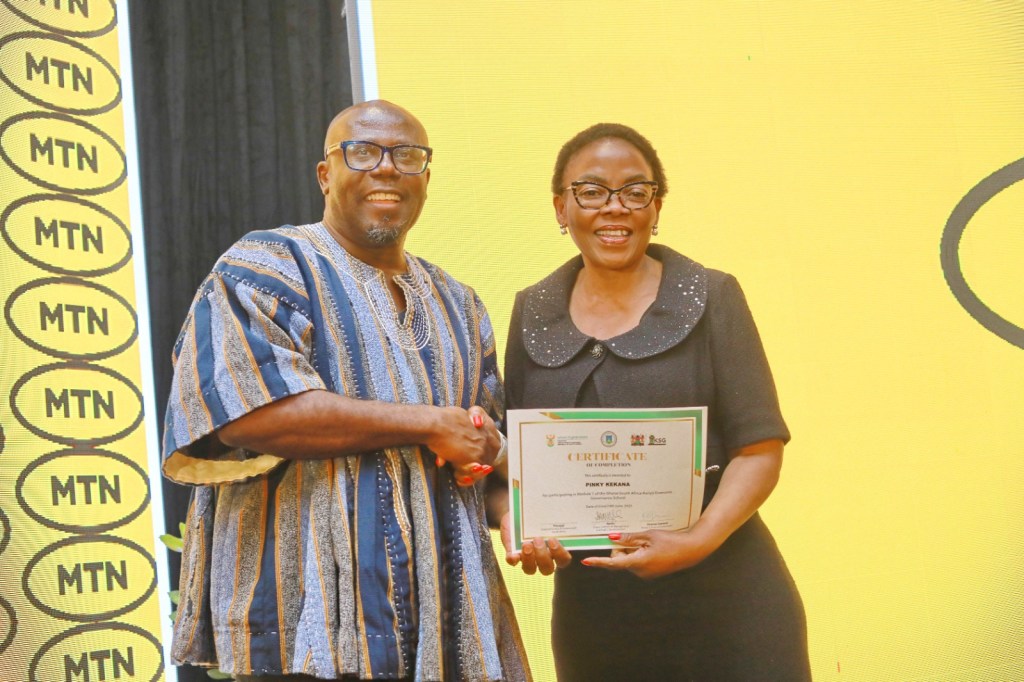
Director of GIMPA, Prof. Samuel Kwadwo Bonsu, welcomed MTN’s contribution and the cross-sector collaboration underpinning the programme: “We are proud as GIMPA to serve, not only as a centre of learning but as a convening ground for critical reflection and collaboration.”
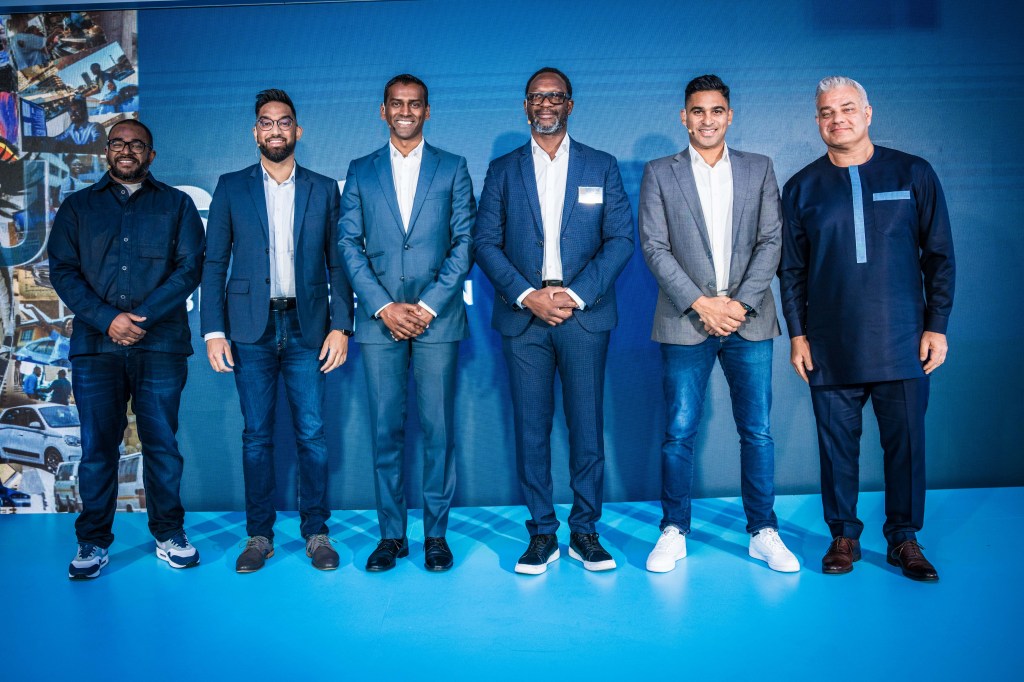
MTN and its digital platform business, Chenosis, in partnership with TransUnion Africa, has launched TransUnion Telco Data Score, a first-of-its-kind credit scoring solution that uses mobile phone call data records to help millions of South Africans with limited or no formal credit history gain access to financial services.
This alternative data scoring model leverages Call Data Records (CDR), which reflect patterns in mobile phone network usage behaviour and correlates it to an individual’s financial behaviour. By using telco data as a proxy for financial reliability, the TransUnion Telco Data Score enables lenders to accurately assess New-to-Credit (NTC) consumers and expand access to safe, affordable credit.
Helping the Financially Excluded
According to TransUnion estimates, over 1.4 million credit-invisible South Africans open new credit accounts each year, contributing to more than four million new accounts over the past three years. Yet traditional scoring models often fail to assess this segment accurately, leaving more than 16 million adults outside the formal credit system.
Approximately 35% of New-to-Credit consumers are under the age of 25, many of whom are new to the workforce and often use credit to buy clothing for work, highlighting the need for innovative tools that support younger, digitally active individuals who may lack a conventional credit footprint. Successfully integrating these and other excluded consumers into the economy could add approximately R173 billion1 to South Africa’s GDP.
“With over 500 million2 people across the continent excluded from formal financial systems, the scale of the challenge is undeniable. Traditional data models fail to reflect the realities of African consumers, leaving millions without access to credit and the opportunities it enables. Financial inclusion isn’t just part of our mission, it’s our mandate,” said Lee Naik, CEO of TransUnion Africa.
“That’s why we believe the only way forward is to think differently, to lead with bold, African-born solutions. Innovations like TransUnion Telco Data Score, designed for Africa, by Africa, are helping us responsibly harness mobile data at scale. In doing so, we’re not only expanding access to credit, but we’re also unlocking economic potential, accelerating inclusive growth, and reshaping the future of finance across the continent.”
Creating Opportunity with Consent and Compliance
The use of CDR data is subject to explicit consumer consent and is managed in compliance with South Africa’s Protection of Personal Information Act (POPIA). MTN is responsible for consent management and will ensure that Chenosis, MTN’s API marketplace, facilitates the connection between MTN’s data ecosystem and partners like TransUnion in a secure and scalable manner.
“This partnership demonstrates how mobile technology and secure data sharing can support positive change in the financial sector and unlock new opportunities for millions of South Africans,” said Selorm Adadevoh, Group Chief Commercial Officer, MTN Group. “We are committed to ensuring that data is used responsibly, with the customer’s interests at the forefront. This is a model of what responsible innovation can look like.”
Empowering Lenders and Growing the Economy
For lenders, the TransUnion Telco Data Score has demonstrated a 25–35% improvement in predictive performance over previous alternative data models, based on recent pre-launch validations across the retail and banking sectors.
By adopting TransUnion Telco Data Score, lenders can better predict user behaviour and support responsible lending by ensuring that credit users at risk of default are not overexposed and can be effectively supported throughout their credit journey.
Importantly, the product also helps New-to-Credit consumers establish and build their credit footprint over time. According to TransUnion data, low-risk individuals significantly increase their credit exposure within 18 months of becoming credit active, underscoring the long-term benefits of responsible financial inclusion strategies.
“With Chenosis, we enable collaboration between mobile operators and solution providers while maintaining high security and compliance standards,” said Waseem Amra, GM – Products and Platforms. “This partnership highlights how secure data access can support innovation in financial services that can transform lives.”
This partnership between Transunion Africa, MTN, and Chenosis reflects the growing trend of using diverse data sources to create more accurate and inclusive financial access. Integrating mobile network insights into credit scoring provides a practical and scalable way to reach more individuals, while maintaining high standards of privacy and compliance.
“With this inclusive innovation, TransUnion has taken the lead in creating an impactful solution to one of the continent’s most pressing challenges – finding responsible pathways to greater financial inclusion that will unlock opportunities for individual and national growth. By turning mobile data into meaningful opportunity, we have set the standard in making transformation possible by showing how technology can be used in groundbreaking alternative ways. Together with MTN and Chenosis, we are building a future where every South African, regardless of their financial history, has the chance to be seen, to be trusted, and to thrive,” Naik concluded. “When financial institutions can measure risk more effectively, they can lend more confidently, and more consumers can access opportunity, and that’s a win for everyone.”
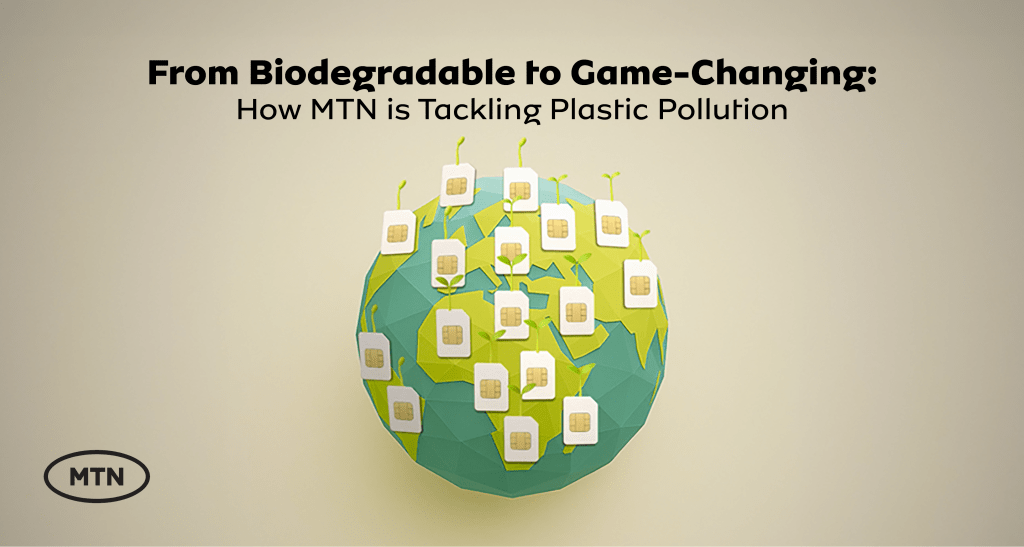
Global plastic production, exceeding 400 million tonnes annually, demonstrates that plastic pollution remains an urgent challenge. More than half of it is designed for single use. The message for World Environment Day 2025 is unequivocal, we need to beat plastic pollution, and we need to do it with urgency.
This issue touches every sector. Telecommunications is no exception. While mobile operators are typically associated with connectivity, the industry has a legacy plastics problem hiding in plain sight. In 2020 alone, approximately 4.5 billion plastic SIM cards were produced globally. These small plastic cards are widely used and rarely recycled. Many end up in landfills or as litter. Others are incinerated, contributing to emissions. They are not the most visible source of waste, but they are a meaningful one, and entirely avoidable.
At MTN, we have taken a deliberate step to reduce this form of plastic waste. In 2024, we introduced bioSIMs, SIM cards made from 100% biodegradable, FSC-certified paper. They perform exactly like plastic SIMs but break down naturally when discarded. No harmful residue. No microplastic. Just responsible design, built for a more sustainable future.
The rollout began in Rwanda and expanding across other markets. It is a practical innovation grounded in science, not sentiment. And while it won’t solve plastic pollution on its own, it is part of a larger, necessary shift in how telecoms, and business at large, approach environmental responsibility.
Africa has a central role in this conversation. The continent contributes just 3–4% of global greenhouse gas emissions, yet it faces some of the worst consequences of climate change. At the same time, Africa is grappling with an accelerating waste challenge. By 2060, annual plastic waste in sub-Saharan Africa is projected to reach 116 million tonnes, a sixfold increase from 2019. The region’s rapid urbanisation and insufficient waste infrastructure make it highly vulnerable to both climate and pollution shocks.
It’s essential. Every tonne of plastic avoided reduces long-term risk, for people, infrastructure, and the planet. Our bioSIMs are part of a broader commitment at MTN to embed sustainability across our operations. As the UNEP reminds us, the solutions are available. What we need now is implementation at scale. Scaling starts with design. The average SIM card may weigh just four grams, but multiplied across millions of users, the footprint grows quickly. A small change in design, if adopted broadly, can remove tonnes of plastic from the supply chain each year. That’s the logic behind our bioSIM. It is efficient, cost-effective, and fundamentally better for the environment.
We are also expanding eSIM adoption, which removes the need for a physical card altogether. Combined, these efforts enable our customers to reduce their impact through the choices they make every day. That is where real momentum lies, not just in corporate strategy, but in shifting consumer norms.
This World Environment Day, the message is clear. Plastic pollution is a problem that can be solved. But doing so will require collective action, practical innovation, and a willingness to change how we operate. MTN is committed to being part of that change, starting with how we connect the communities we serve.
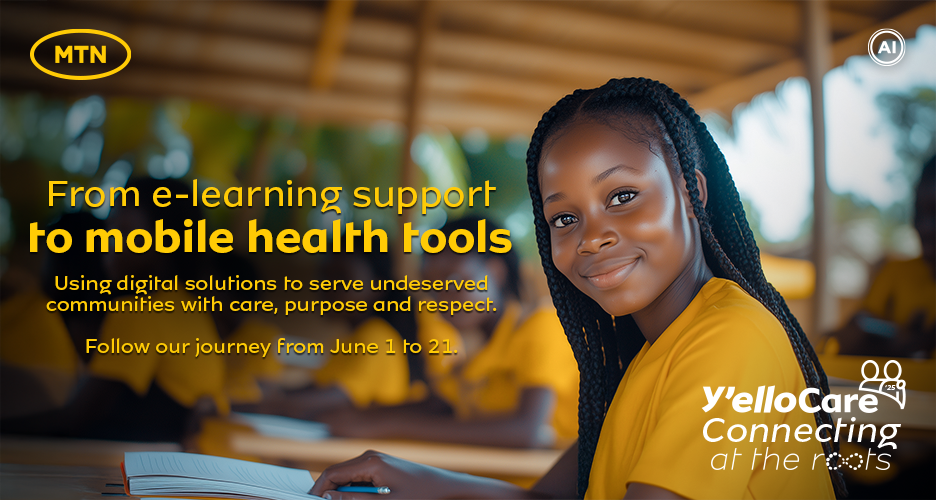
MTN Group is pleased to announce the 2025 edition of 21 Days of Y’ello Care, our highly anticipated flagship employee volunteerism campaign, taking place from 1-21 June 2025.
Now in its 18th year, Y’ello Care continues to demonstrate the power of employee-led action to drive meaningful change across the communities we serve. Since its inception, the campaign has mobilised thousands of MTN employees to support impactful initiatives focused on education, health, youth development, and economic empowerment.
Each year, the campaign evolves to reflect the most pressing needs of society, while remaining grounded in our commitment to enable the benefits of a modern connected life for everyone. Over the past 6 years, we have reached the lives of 107,034 people across our communities through the impact of 14,376 MTN volunteers completing 56,306 cumulative hours of community engagement.
This year’s theme, “Connecting at the Roots – Connecting communities through the use of digital tools,” responds to the ongoing challenge of digital exclusion, particularly in rural, remote, and underserved areas. Across many parts of Africa, limited connectivity continues to constrain access to education, healthcare, financial services, and economic opportunity. Women, youth, persons with disabilities, and displaced populations are disproportionately affected.
Y’ello Care 2025 will see MTNers across our markets implement practical, community-led initiatives that leverage technology to unlock connectivity to bridge these gaps.
“Y’ello Care reflects our belief that real progress begins at the grassroots level. In 2025, we are focusing our efforts on the communities that remain on the margins of digital access and connectivity. By applying technology in ways that are practical, inclusive, and sustainable, we are working to ensure that no one is left behind,” said Nompilo Morafo, MTN Group Chief Sustainability and Corporate Affairs Officer. “Our people remain the driving force behind this campaign, and their continued commitment to serving with purpose is what makes Y’ello Care a true embodiment of MTN’s values.”
In line with MTN’s values, the campaign prioritises meaningful partnerships, responsible delivery, and inclusive engagement. Through trusted collaborations with community stakeholders, we aim to develop practical solutions that are responsive to local contexts, respectful of community aspirations, and inclusive of those most often excluded from digital progress.
Through Y’ello Care, MTN reaffirms its belief in the transformative power of technology and in the ability of our people to be agents of positive change. We look forward to working together with communities and partners to deliver meaningful, sustainable impact where it is needed most.
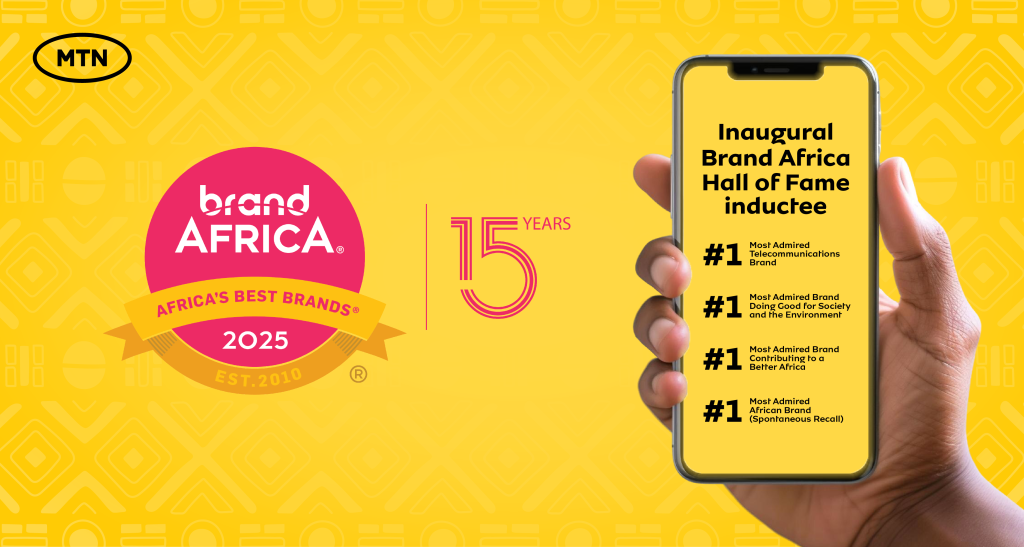
MTN Group has been inducted into the inaugural Brand Africa Hall of Fame “in recognition of its transformational impact on African consumers and its role in shaping a positive African narrative”. MTN was also recognised as the #1 Most Admired African Brand Contributing to a Better Africa; the #1 Most Admired African Brand (spontaneous recall); the #1 Most Admired Brand Doing Good for Society and the Environment; and #1 Most Admired Telecommunications Brand.
The Hall of Fame honour, introduced this year by Brand Africa, acknowledges brands that have demonstrated sustained excellence and influence on the continent over the past decade. MTN’s induction reflects its ongoing commitment to enabling digital access, expanding financial inclusion, and contributing meaningfully to Africa’s development.
The announcement was made alongside the release of the 2025 edition of the Brand Africa 100 rankings – an annual, independently conducted survey spanning more than 30 African countries and representing more than 85% of the continent’s population and GDP.
“It is an honour to be inducted into the Brand Africa Hall of Fame and to be named the most admired African brand contributing to a better Africa, the most admired African brand by spontaneous recall, as well as the brand most admired for doing good for society and the environment,” said Ralph Mupita, MTN Group President and CEO.
“That this recognition comes during Africa Month gives it added significance. It reflects the progress we continue to make as a continent and the role trusted brands must play in advancing inclusive, digitally enabled growth. We are grateful for the confidence placed in MTN by the people we serve and remain committed to delivering meaningful impact.”
Mupita also acknowledged the collective effort behind the brand’s success, thanking MTNers, partners, and other stakeholders across the continent for their role in making this recognition possible.
MTN operates mobile networks in 16 countries. Since 2021, the company has been guided by its Ambition 2025 strategic intent of Leading digital solutions for Africa’s progress. This underscores MTN’s commitment to driving digital and financial inclusion and fostering innovation across the continent.
Further validating its brand leadership, MTN was recently ranked once again as South Africa’s most valuable brand. The accolade was made in the 2025 Brand Finance Top 100 Report, which accorded MTN a brand valuation of R50.7 billion. MTN has held this position every year since the survey’s inception in 2012.
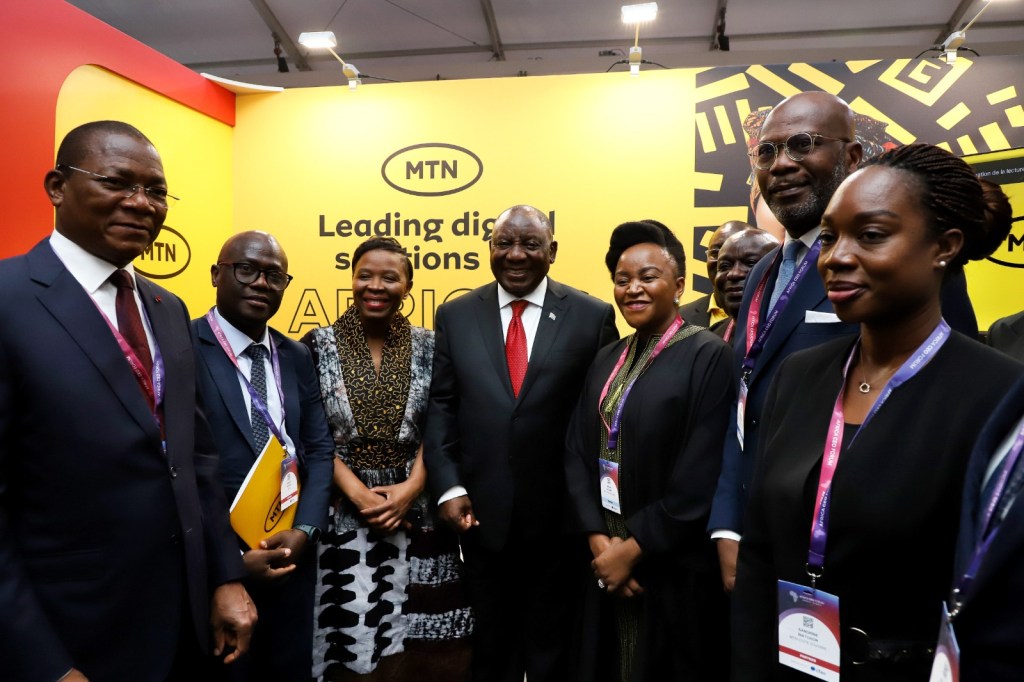
As part of our work to deepen stakeholder relations and partnerships for Africa’s progress, MTN Group is a platinum sponsor of the Africa CEO Forum, which brings together the continent’s most influential decision-makers for two days of meetings on the private sector’s key role in accelerating Africa’s development.
The 12th edition of the annual summit is taking place in Abidjan on 12–13 May 2025. Some 2 000 business leaders, investors and policy makers are in attendance to shape practical strategies to expedite Africa’s economic transformation.
The theme for 2025 is ‘Africa in a transactional world: Can a new deal between state and private sector deliver the continent a winning hand?’. It recognises the need for governments to strike a new deal with the African private sector, anchored on three pillars: an improvement of governance and accountability; targeted public policies to address Africa’s structural challenges; and the accelerated implementation of the African Continent Free Trade Agreement (AfCFTA).
“At part of our shared value priority to support Africa’s progress, we at MTN seek to align with the priorities of our continent and nation states and to actively engage governments and regulators to help shape industry dynamics,” said MTN Group Chief Sustainability and Corporate Affairs Officer Nompilo Morafo.
“MTN’s participation at the Africa CEO Forum reflects our nation states programme and our commitment to work together to enable inclusive growth,” she added, noting that escalating tensions in world geopolitics present headwinds to Africa’s budding economic recovery. “We believe the continent’s sustainable progress will come from trusted partnerships, coherent policy environments and shared investment in the systems that power Africa’s digital and economic future.”
As part of the Forum programme, MTN Group Senior Vice President: Markets, Ebenezer Asante, is participating in a panel discussion exploring tax policy and resource mobilisation. The session focuses on how public and private sector stakeholders can consult and collaborate to ensure fiscal environments that support both domestic priorities and the stability required for sustained investment.
MTN Côte d’Ivoire CEO Mitwa NG’ambi is contributing to a strategic roundtable on Africa’s digital transformation. This is looking at strategies to enhance network resilience and accelerate infrastructure deployment – particularly in underserved areas – and the role of policymakers in fostering an investment-friendly environment that accelerates digital transformation.
MTN Group’s sponsorship and participation at the Africa CEO Forum underscore our commitment to building a more connected, inclusive and prosperous Africa.
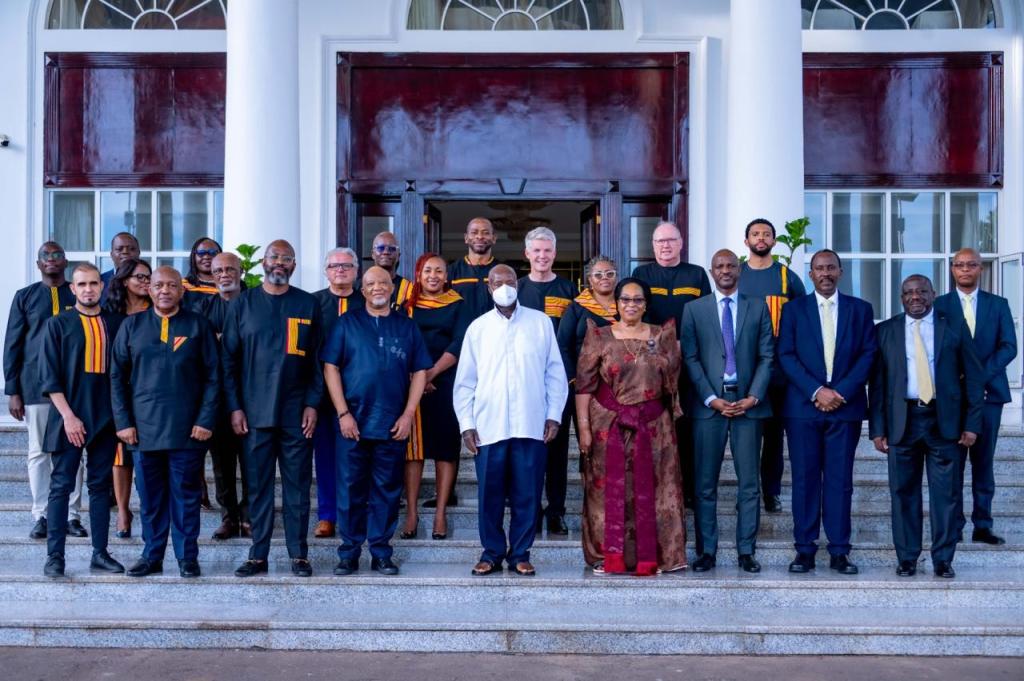
MTN Group this week convened its annual Chairmen’s Forum in Uganda, bringing together Board Chairs from its operating companies and senior executives from across the business. Held in Kampala, the Forum serves as a key leadership platform to reflect on strategic progress, strengthen alignment, and advance the Group’s ambition to lead digital solutions for Africa’s progress.
On the sidelines of the Forum, the MTN Group delegation, led by Group Chairman Mcebisi Jonas and Group President and Chief Executive Officer Ralph Mupita, engaged with national leaders and key stakeholders to reinforce the Group’s long-standing commitment to Uganda as a strategic market.
These engagements included a high-level meeting with His Excellency President Yoweri Kaguta Museveni at State House, Entebbe, as well as a stakeholder dinner hosted by MTN, attended by senior government officials.
During the State House meeting, President Museveni welcomed MTN’s continued investment and emphasised the importance of targeting sectors that generate employment and expand the economy. “If people have jobs and incomes, they will buy more phones and use them more,” he said. “That’s why we must invest in the four key sectors of wealth and job creation: commercial agriculture, manufacturing, services, and ICT.” He further encouraged MTN to explore cross-border investment as a means of promoting regional integration and intra-African trade.
Uganda holds a distinct place in MTN’s history as the first country outside South Africa where the Group secured a telecommunications licence. Granted in 1998, this licence marked the beginning of MTN’s international expansion, laying the foundation for what would become one of Africa’s leading digital infrastructure and platform businesses. Today, MTN Uganda stands as one of the Group’s most important markets, commercially and developmentally.
Mcebisi Jonas, MTN Group Chairman, expressed appreciation for the long-standing collaboration between MTN and the Government of Uganda. “We just came today to say thank you very much for the support you have always given us. We have had excellent collaboration from the regulators, and MTN is not here for the short term—we are here for the long haul,” he said. He also emphasised MTN’s interest in strengthening trade and business linkages between Uganda and South Africa, and highlighted the Group’s broader capacity to support national development. “We believe there is real opportunity to help Ugandan businesses enter the South African market, and that is something we can explore further.”
As MTN Group continues to drive the acceleration of Africa’s digital future, Uganda remains a key partner, demonstrating the enduring value of early investment, collaborative nation-building, and a shared commitment to inclusive and sustainable progress.
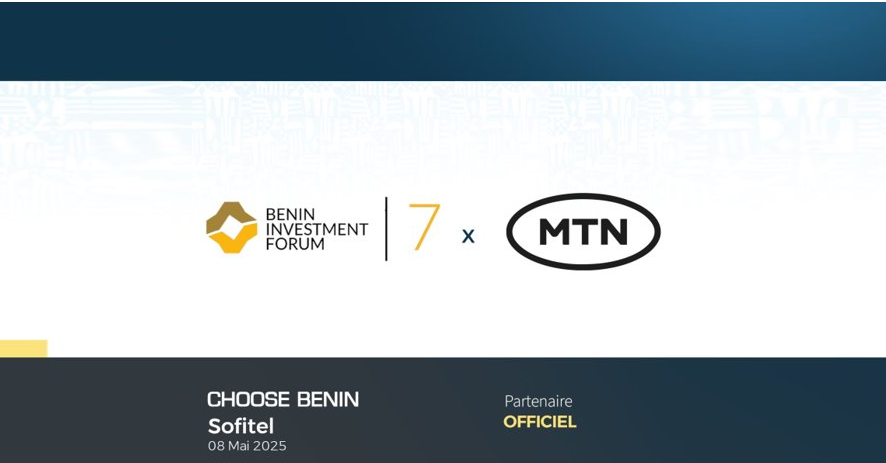
The 7th edition of the Benin Investment Forum (BIF) will take place from 8 to 9 May 2025 at the Sofitel Hotel in Cotonou, bringing together leaders from government, business, and civil society to foster economic cooperation, attract foreign direct investment, and promote inclusive development. Organised by the Government of Benin through the Investment and Export Promotion Agency (APIEX) and the Benin Chamber of Commerce and Industry, the Forum comes at a crucial moment in Benin’s development, underpinned by structural reforms and macroeconomic stability.
MTN Group proudly joins the Forum as the Platinum and Headline Sponsor. This strategic partnership follows MTN Group President and CEO, Ralph Mupita’s market visit to Benin in January 2024, where the company reaffirmed its longstanding commitment to the country’s development as a trusted partner. MTN’s participation at BIF 2025 will be led by Senior Vice President Markets Ebenezer Asante, who will deliver a keynote address at the Opening Ceremony on the topic “MTN: Partner in Africa’s Development.” He will be joined by MTN Benin CEO Uche Ofodile and MTN Group Chief Sustainability and Corporate Affairs Officer Nompilo Morafo, both of whom will participate in high-level discussions on finance, the future of technology, and women’s leadership in business.
MTN will also take the lead in hosting the exclusive MTN Investment Night, a high-level networking engagement aimed at facilitating meaningful dialogue among investors, policymakers, and senior business leaders. As part of its broader contribution to the Forum, MTN will collaborate with the Benin Ministry of Trade and Commerce to evaluate start-up pitches, spotlighting innovative solutions from emerging entrepreneurs. Additionally, the Group will deliver an inspirational leadership masterclass, curated to inspire and equip the next generation of African business leaders with insights drawn from MTN’s journey of growth and transformation across the continent.
Having operated in Benin for more than 25 years, MTN has made significant contributions to the country’s digital infrastructure, financial inclusion, and social development. The Group has committed over $215 million in new investments through 2026, including the rollout of 5G services, expansion of fibre connectivity, and the construction of a new MTN Benin headquarters. MTN’s impact also extends into health, education, and entrepreneurship through the work of the MTN Foundation, reinforcing its belief that digital access is key to unlocking national and regional progress.”
Commenting on MTN’s commitment to the Benin Investment Forum and the country, Ebenezer Asante, MTN Group Senior Vice President, Markets stated: “Our presence at the Benin Investment Forum reflects more than sponsorship, it’s a reflection of our unwavering belief in Benin’s potential and our shared journey toward inclusive digital transformation. Through strategic partnerships rooted in national development goals, MTN is proud to be a catalyst for progress, investment, and innovation in Benin and across the continent.”
MTN’s participation in the Benin Investment Forum 2025 exemplifies the company’s belief that inclusive, resilient growth must be rooted in strategic collaboration between the public and private sectors. As a partner of choice to African governments, MTN continues to play a leading role in building the infrastructure, capabilities, and ecosystems required for nations to thrive in a digital world. Through its involvement in BIF 2025, MTN reaffirms its commitment to Benin’s development journey and to advancing Africa’s digital and economic integration.
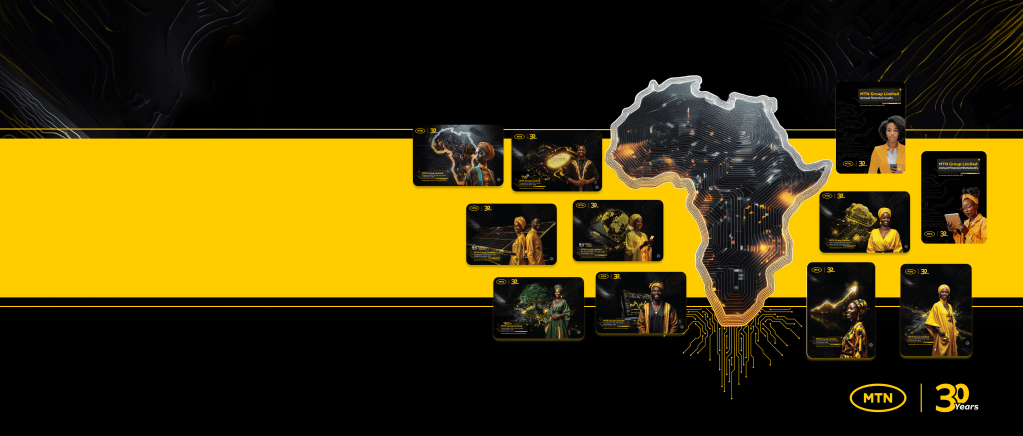
MTN Group announces the release of our annual reports for 2024. Produced under the theme of ‘Accelerating Africa’s digital future’, the suite of reports provides a thorough overview of our robust underlying performance, strategic delivery and contribution to society, as well as our priorities ahead.
“Committed to operating responsibly and ethically, in 2024 MTN remained focused on executing on our strategic intent of leading digital solutions for Africa’s progress, despite the global uncertainties,” said MTN Group President and CEO Ralph Mupita.
“We couldn’t have done this without the support of our many diverse stakeholders. We invite you to read our reports, which strive to provide meaningful information tailored for various specific audiences.”
The 2024 Integrated Report tells the overall MTN value-creation story, detailing our strategic achievements and initiatives, including our operational highlights, financial performance and progress on ESG. It explains how MTN leverages our brand, broad presence and skills as well as leading connectivity business, fintech offerings and digital infrastructure to expand digital and financial inclusion across Africa. This is done while mitigating risks and making the most of opportunities in our 16 markets.
This information, which reflects integrated thinking at the Group, endeavours to assist our investors and other stakeholders to understand the Group’s overall health and future focus. It is published alongside sustainability and financial reports as well as other important information for our shareholders.
ESG remains at the core of our strategy and is aligned with our work to advance the United Nations Sustainable Development Goals through our business activities and our support of governments, communities and customers. Our Sustainability Report provides a view of the Group around sustainability-related risks and opportunities that could reasonably be expected to affect MTN’s prospects.
As stewards of the digital age, we believe that safeguarding human rights is at the core of connectivity. In a year of numerous elections across the world, our Transparency Report outlines how MTN reinforced digital rights in 2024 by ensuring secure, uninterrupted connectivity to support free and fair democratic processes.
It also spells out how the rapid expansion of AI presents new ethical risks, prompting MTN to develop a Responsible AI Policy to uphold digital rights and data privacy.
In 2024, Africa faced intensifying climate risks, making sustainability and resilience essential to MTN’s strategy, regardless of changes in countries’ and companies’ adherence to climate policies. Our Climate Report highlights how we are actively addressing both mitigation and adaptation while leveraging emerging opportunities. In the year, we surpassed our emissions reduction target, cutting emissions by more than 46% off a 2021 baseline.
Our Tax Report underscores the role we play in supporting the socioeconomic development of our host nations. In 2024, MTN’s total tax contribution was R52.7 billion, made up of corporate taxes, indirect taxes, withholding taxes, payroll taxes, operating licence fees and other payments to government authorities.
The suite of annual reports also includes a Notice of Annual General Meeting, which invites our shareholders to participate in our virtual meeting on Thursday 29 May 2025. Our Remuneration Report provides transparent disclosure of the remuneration of our leadership based on performance against strategic priorities.
Our ESG Data Booklet is a handy resource for those interested in detailed disclosures relating to MTN’s planet, people, ethics and governance matters. As well as relevant statistics, it highlights our policy and position statements on various ESG issues as well as a comprehensive GRI disclosure index.
“Our prospects and investment case are underpinned by the structural demand we see in data and fintech,” said Mupita. “As a business, we remain resolute in our commitment to accelerating Africa’s digital future and will maintain the focus on operational excellence and strategic execution to capture the exciting growth opportunities in our footprint. We thank our stakeholders for their ongoing support.”
Click HERE to view the reports
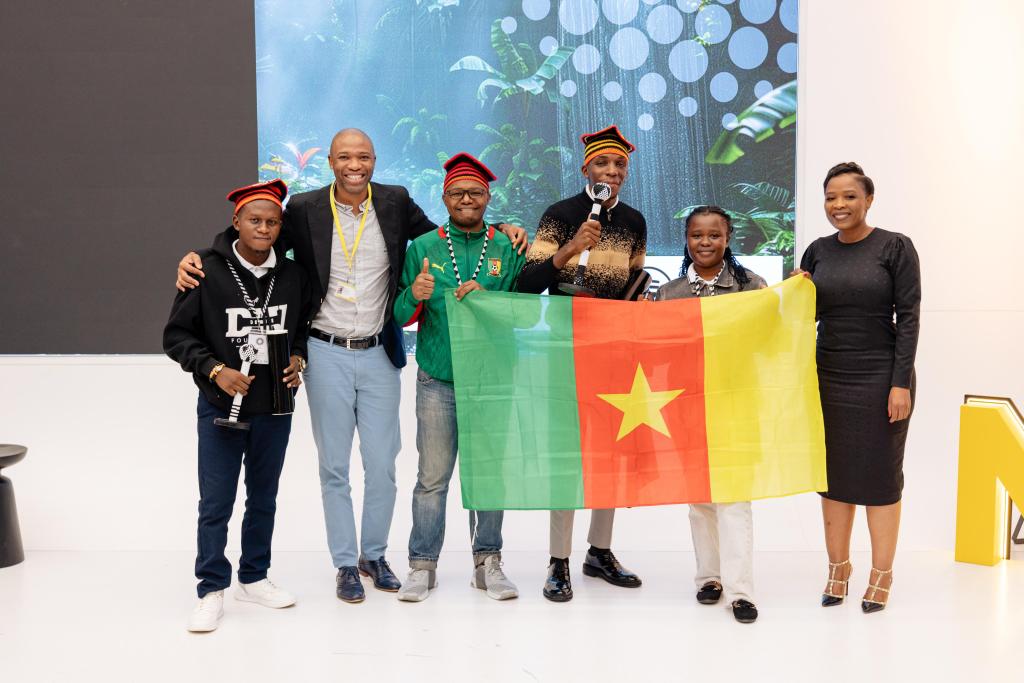
The 2024 Africa PachiPanda Challenge, an initiative by MTN Group in partnership with WWF and FNB WesBank, concluded this week with a powerful celebration of Africa’s emerging eco-entrepreneurs. Hosted in Johannesburg, South Africa, the grand finale brought together the brightest young minds from across the continent, united by a shared vision for environmental sustainability and inclusive growth.
The initiative was designed to spotlight Africa’s next generation of environmental leaders and equip them with the tools, mentorship, and networks needed to scale their climate-smart solutions. Finalists from Nigeria, Cameroon, Zambia, and South Africa were invited to participate in a transformative two-day programme, which included expert-led masterclasses on business development, sustainable innovation, and impact measurement, culminating in a vibrant finale event that showcased the continent’s most promising green ventures.
Among the standout innovators, chosen by a distinguished panel of judges for its outstanding scalability, measurable impact, Moses Afopezi of Cameroon claimed first prize for his project AgricFresh, a tech-enabled platform designed to reduce post-harvest loss by professionalising farm management and enhancing market access. By integrating solar-powered cold storage systems, AgricFresh helps extend the shelf life of crops and supports a more efficient, climate-resilient agricultural ecosystem.
Olabisi Rafatu Emmanuel from Nigeria earned second place, and Jean Blaise Seka, also from Cameroon, secured third, with both recognised for their impactful, community-driven solutions that address local environmental challenges with creativity and ingenuity.
“Congratulations to Moses Afopezi and the AgricFresh team for this well-deserved recognition. Their work reflects the kind of grounded, forward-thinking innovation that communities across Africa urgently need,” said Nompilo Morafo, MTN Chief Sustainability and Corporate Affairs Officer. “The Africa PachiPanda Challenge is one of the ways we’re working with partners to support climate entrepreneurship that is practical, inclusive, and rooted in real local needs.”
Innovation, particularly in climate-tech and sustainable development, is increasingly recognised as a cornerstone of inclusive growth. According to the African Development Bank, every dollar invested in climate-resilient infrastructure yields four dollars in economic benefits. Initiatives like the Africa PachiPanda Challenge are helping to unlock this potential by equipping young innovators with the tools to scale locally rooted solutions. From digital platforms for waste management to energy-efficient technologies for agriculture, these ventures reflect the ingenuity of a generation that is redefining what progress looks like, bold, green, and built from the ground up.
WWF echoed their commitment to supporting youth-led solutions. WWF-Zambia Chief External Engagement Officer Fungai Musana, as the lead for the Africa lag said, “WWF is proud to be part of a historic moment, the successful execution of the inaugural Africa PachiPanda Innovation Challenge. This trailblazing, youth-led initiative marks a first of its kind on the African continent. A huge congratulations to the winners for their cutting-edge innovations! And to all participants, well done for stepping up and being part of this incredible journey. WWF is honoured to collaborate with MTN Group in empowering the next generation of sustainable leaders. We believe the ideas born from this challenge have the power to drive meaningful, lasting change for communities and the environment across Africa.”
Adding further support, FNB WesBank underlined the critical role that green innovation plays in Africa’s future, Kyle Durham Head of Sustainability at FNB Commercial, added that FNB, in partnership with WesBank is thrilled to be a part of the Africa PachiPanda Challenge and to support this groundbreaking initiative. The event has been a showcase of inspiring and visionary solutions to unique challenges, and AgricFresh stands out as a shining example of the innovation, passion, and dedication that young eco-entrepreneurs bring to the table, creating lasting impacts for a sustainable future.
As the overall winner of the Africa PachiPanda Challenge, Moses Afopezi AgricFresh project will receive USD 5000, along with ongoing mentorship and strategic support from MTN Group, WWF, UNDP, GSMA and other partners to expand the reach and impact of their innovation. Moses shared a brief insight on his experience: “Never did I imagine that the path to an international stage would be paved by the work we are doing at the grassroots level with AgricFresh. The recognition we’ve received fills me with immense joy and hope for the farmers whose lives we aim to improve. With the knowledge and prize, we’re now empowered to expand our reach to two more communities in Cameroon’s war-affected regions.”
Through this initiative, MTN, together with WWF and FNB WesBank, reinforces its commitment to supporting ideas that deliver lasting value for the environment and local communities. With a footprint in 16 markets across Africa, MTN recognises the unique responsibility and opportunity to provide young innovators with the visibility, resources, and support they need to thrive.
This challenge is a testament to how MTN is embedding sustainability into the way it operates, by investing in people and purpose, with a long-term view toward shared prosperity.